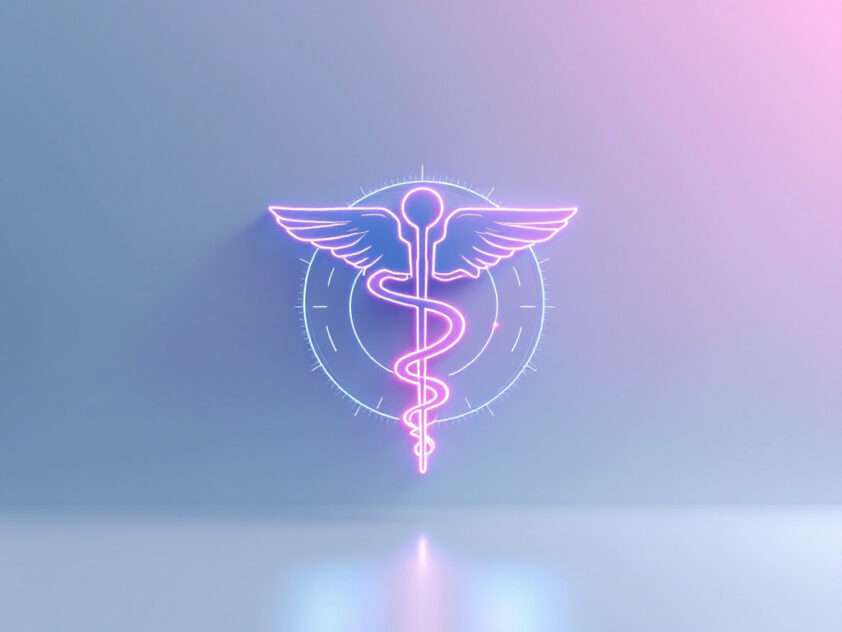The healthcare industry is experiencing significant technological advancements, with AI agents playing a crucial role. These intelligent systems are transforming patient care, diagnosis, and hospital operations, making healthcare more precise, efficient, and accessible.
AI agents in healthcare are sophisticated partners capable of analyzing extensive medical data, assisting in complex decision-making, and predicting health outcomes with remarkable accuracy. From streamlining administrative tasks to enhancing diagnostic capabilities, these AI-powered solutions address significant challenges faced by healthcare providers and patients.
We will explore the transformative potential of AI agents, their integration into various aspects of healthcare delivery, and their applications in improving operational efficiency, boosting diagnostic accuracy, and personalizing patient care. Additionally, we will examine emerging trends that will shape the future of AI in healthcare.
For technical leaders and developers in the healthcare sector, understanding the capabilities and implications of AI agents is essential. These technologies are not just changing healthcare delivery; they are redefining possibilities in medical research, treatment planning, and patient engagement. As we explore this topic, we will gain insights into how AI agents can revolutionize healthcare, creating opportunities for innovation and improved patient outcomes.
Enhancing Patient Care with AI Agents
Imagine having a knowledgeable healthcare assistant available 24/7, ready to answer your questions and guide you through your medical journey. This isn’t science fiction; it’s the reality of how AI agents are transforming patient care today.
AI-powered virtual health assistants are changing the way patients interact with healthcare systems. These intelligent agents offer round-the-clock support, providing timely information and simplifying what can often be a complex and intimidating healthcare experience.
One of the most impactful ways AI agents enhance patient care is through continuous monitoring and personalized reminders. These virtual assistants can track vital signs in real-time, alerting healthcare providers to any concerning changes. For patients managing chronic conditions, medication adherence is crucial. AI agents excel at sending timely reminders, helping patients stay on track with their treatment plans.
The benefits go beyond just reminders. These AI-driven assistants can offer basic medical advice, triage symptoms, and help patients determine when they need to seek in-person care. This capability not only improves patient outcomes but also helps reduce the burden on overworked healthcare professionals.
The impact on patient satisfaction is significant. A survey by Deloitte found that 62% of patients are comfortable interacting with AI-powered health assistants for basic inquiries and follow-ups. This high level of acceptance speaks to the value patients find in having readily available support and information.
AI agents in healthcare improve patient experience by offering 24/7 support through virtual health assistants, providing timely information, and simplifying the patient journey.
– WalkingTree Technologies
The potential for improved health outcomes is equally promising. AI agents can help catch potential health issues early by analyzing patterns in patient data. For example, an AI assistant might notice subtle changes in a patient’s reported symptoms or vital signs that could indicate the need for medical intervention.
While the benefits are clear, it’s important to note that AI agents are not meant to replace human healthcare providers. Instead, they serve as powerful tools to augment and enhance the care that medical professionals provide. By handling routine inquiries and monitoring tasks, AI frees up healthcare workers to focus on more complex cases and personal patient interactions.
The role of AI agents in patient care is likely to expand. Advancements in natural language processing and machine learning will make these virtual assistants even more sophisticated and capable. However, maintaining a balance between technological innovation and the human touch in healthcare will be crucial.
AI agents are proving to be valuable allies in enhancing patient care. By offering constant support, personalized assistance, and early intervention capabilities, these virtual health assistants are helping to create a more responsive, efficient, and patient-centric healthcare system.
Streamlining Healthcare Operations with AI Agents
AI agents are transforming how healthcare organizations handle day-to-day tasks. These smart systems take over routine jobs that used to consume staff time. Here’s how AI makes healthcare run smoother and saves money.
Imagine a doctor’s office where AI handles appointment scheduling. No more phone tag or double-bookings. The AI agent finds the best times for patients and doctors, ensuring everyone’s time is used well. This means less stress for staff and shorter wait times for patients.
Billing is another area where AI excels. These systems can quickly process insurance claims with fewer mistakes. This means hospitals and clinics get paid faster and have fewer rejected claims. One study found that AI could help the U.S. healthcare system save up to $150 billion a year through better efficiency.
AI agents also help with patient follow-ups. They can send reminders about appointments or medications, freeing up nurses to focus on in-person care. This personal touch, powered by AI, helps keep patients healthier and more engaged in their care.
By taking on these tasks, AI allows healthcare workers to spend more time with patients. Instead of shuffling papers, nurses and doctors can listen to concerns and provide better care. This not only improves patient satisfaction but can lead to better health outcomes.
AI in healthcare isn’t about replacing humans. It’s about giving them superpowers to provide better, more personalized care.
– Dr. Eric Topol, Author of ‘Deep Medicine’
The cost savings from AI are significant. With faster billing and fewer errors, hospitals can reduce their administrative costs. This could mean lower healthcare costs for patients in the long run. Some experts think AI could cut administrative costs by up to 30%.
AI agents are making healthcare more efficient and effective. By handling routine tasks, they free up human staff to do what they do best: care for patients. As these systems get smarter, we can expect even more improvements in healthcare operations.
Improving Diagnostic Accuracy

Artificial intelligence agents are enhancing healthcare by significantly improving diagnostic accuracy. By leveraging advanced algorithms to analyze medical images, laboratory results, and comprehensive patient histories, AI systems can detect patterns and anomalies with high precision, often surpassing human capabilities. One advantage of AI in diagnostics is its ability to rapidly process vast amounts of data.
For example, a study published in Nature Medicine found that an AI system analyzed chest X-rays for signs of tuberculosis with 98% accuracy, compared to 96% accuracy for human radiologists. The AI completed the task in seconds, while human experts required an average of 4 minutes per image. Beyond speed, AI agents excel at identifying subtle indicators that may elude even experienced clinicians.
In a study involving skin cancer detection, researchers trained a deep learning algorithm on nearly 130,000 clinical images. When tested against board-certified dermatologists, the AI demonstrated equivalent accuracy in diagnosing malignant lesions and proved superior at detecting early-stage melanomas. The implications for patient outcomes are profound, enabling faster and more accurate diagnoses.
AI augments healthcare providers’ capabilities, leading to earlier detection of diseases, reduction in false positives and unnecessary procedures, more precise treatment plans tailored to individual patients, and decreased likelihood of misdiagnoses. While AI shows immense promise, it’s crucial to note that these systems support, not replace, human medical professionals. The synergy between artificial and human intelligence offers the most robust approach to improving diagnostic accuracy and patient care.
As we continue to refine and expand the role of AI in medical diagnostics, we can anticipate further improvements in accuracy, efficiency, and patient outcomes. The integration of AI agents into healthcare systems represents a significant step forward in providing timely, precise, and effective medical care.
Though AI can offer some useful tools, its limitation is that it lacks the ability to create clinical context and should be viewed with caution when using it as a diagnostic tool.
– Robert Applebaum, CEO & Plastic Surgeon, Beverly Hills Breast Reduction Center
Future Trends in AI Healthcare: Revolutionizing Patient Care
The healthcare landscape is on the cusp of a profound transformation, driven by remarkable advances in artificial intelligence. Several game-changing trends are emerging that promise to reshape how we approach patient care and disease prevention.
Wearable health monitoring devices are at the forefront of this transformation. These sophisticated gadgets are evolving into miniature health labs we wear on our wrists or clothing. Imagine a smartwatch that not only tracks your heart rate and sleep patterns but also analyzes your sweat composition to detect early signs of dehydration or even certain diseases. These AI-powered devices will provide a continuous stream of health data, allowing for real-time monitoring and early intervention.
Telemedicine, enhanced by AI, is another trend rapidly gaining momentum. The days of waiting weeks for a doctor’s appointment may soon be behind us. AI-enabled virtual health assistants will be able to triage patients, answer routine medical questions, and even assist in remote diagnoses. For patients in rural areas or those with mobility issues, this could be a game-changer, providing access to high-quality healthcare from the comfort of their homes.
In the realm of clinical documentation, natural language processing (NLP) is set to liberate healthcare providers from the burden of paperwork. Imagine a scenario where a doctor simply speaks normally during a patient consultation, and an AI system accurately transcribes the conversation, extracts relevant medical information, and automatically updates the patient’s electronic health record. This not only saves time but also reduces errors and allows healthcare professionals to focus more on patient care.
Perhaps most exciting is the potential of predictive analytics to revolutionize preventive care. By analyzing vast amounts of patient data – from genetic information to lifestyle factors – AI systems will be able to identify individuals at high risk for specific diseases long before symptoms appear. This shift from reactive to proactive healthcare could dramatically improve patient outcomes and reduce the overall burden on healthcare systems.
“The future of healthcare is predictive, preventative, personalized and participatory.”
– Leroy Hood, systems biologist and biotechnology pioneer
As these trends converge, we’re moving towards a healthcare ecosystem that’s more personalized, efficient, and effective than ever before. While challenges around data privacy and ethical AI use remain, the potential benefits are immense. The future of AI in healthcare isn’t just about sophisticated technology – it’s about empowering patients, supporting healthcare providers, and ultimately saving lives.
“AI in healthcare isn’t replacing doctors – it’s augmenting their capabilities and allowing them to provide better care.” This sentiment, echoed by many in the field, encapsulates the transformative potential of these emerging trends.
Conclusion: The Transformative Power of AI Agents in Healthcare
AI agents are transforming the healthcare industry, improving patient care, streamlining operations, and enhancing diagnostic accuracy. From AI-powered chatbots handling routine inquiries to sophisticated algorithms analyzing medical images with precision, these digital assistants are invaluable across healthcare delivery.
AI agents are not just automating mundane tasks; they augment human expertise, enabling healthcare professionals to make informed decisions and focus on patient care. By processing vast amounts of data quickly, AI agents help identify patterns and insights that might otherwise go unnoticed, potentially leading to earlier disease detection and more personalized treatment plans.
As the healthcare industry evolves, those who embrace AI agent technology now stand to gain significant competitive advantages. Platforms like SmythOS make it easier for healthcare organizations to build and deploy custom AI agents tailored to their specific needs. With its intuitive interface and powerful capabilities, SmythOS empowers developers and healthcare professionals to create AI solutions that address complex challenges in patient care and operational efficiency.
The future of healthcare lies at the intersection of human expertise and artificial intelligence. By implementing AI agent technology today, healthcare providers can position themselves at the forefront of innovation, driving improvements in patient outcomes, operational efficiency, and overall quality of care. AI agents will play an increasingly critical role in shaping a healthcare system that is more responsive, efficient, and effective in meeting the needs of patients and providers alike.
